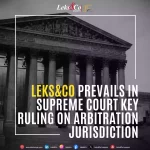 New Law Number 17 of 2012 on Cooperative has been promulgated on 30 October 2012 (“Cooperative Law“). This Cooperative Law has revoked the previous law of 1992.
New Law Number 17 of 2012 on Cooperative has been promulgated on 30 October 2012 (“Cooperative Law“). This Cooperative Law has revoked the previous law of 1992.
Establishment and Article of Association
Cooperative consists of primary cooperative and secondary cooperative. Primary cooperative shall be established by at least 20 people, who separate some of their wealth as cooperative’s authorized capital. On the other hand, secondary cooperative is able to be established by at least 3 primary cooperatives.
Pursuant to Article 9 of Cooperative Law, establishment of cooperative shall be conducted through notarized deed of establishment of cooperative in Indonesian language. In the event that there is no notary in sub district, the deed of cooperative’s establishment is able to be made by district head (camat) who has been approved as an official officer to arrange cooperative’s deed by Minister of Cooperative (“Minister“).
Further, deed of cooperative’s establishment shall be submitted to Minister to obtain legalization as a legal entity. Legalization of cooperative as legal entity will be granted within 30 days from the submission date of deed of establishment of cooperative to Minister.
Deed of cooperative’s establishment as mentioned above contains article of association of cooperative and other details which are related with the establishment of cooperative such as composition, name, birth place and date, address and occupation of first supervisor and management.
Article of association is able to be amended by member’s meeting if member’s meeting is attended by at least 2/3 of the total members of cooperative and the resolution of amendment of article of association is approved by at least ½ of the total attended members of cooperative. Amendment of some matters as follows shall obtain approval from Minister:
a. name;
b. domicile;
c. membership;
d. cooperative’s purpose;
e. cooperative’s business activities; and
f. cooperative’s period of incorporation if the article of association regulates it.
Announcement
Under Article 24 of Cooperative Law, deed of cooperative’s establishment and deed of amendment of article of association which has been legalized by Minister shall be announced in the state gazette. The announcement will be conducted by the Minister. Minister also has the responsibility to organize cooperative’s list and the cooperative’s list is open for public.
Cooperative’s Membership
Cooperative’s member is the owner and also as the user of cooperative’s services. The reason of provision of “owner” as well as “cooperative service user” as mentioned above is, besides the liability of owner is limited to member’s paid-up capital, the member also takes economic advantages from the cooperative services.
The membership of cooperative is open for anyone who is able to utilize the cooperative’s service and take responsibility as the cooperative’s member. The membership of cooperative is recorded in the list of membership book. Further, in accordance with Article 28 paragraph (2) of Cooperative Law, the membership of cooperative is not able to be transferred.
Organization of cooperative
The organization of cooperative consists of member’s meeting, supervisor and manager. The member’s meeting has the highest authority in the cooperative. Further, supervisor is appointed by the cooperative members through member’s meeting. The supervisor has a responsibility to (a) propose the manager’s candidate; (b) give advice and supervision to manager; (c) supervise manager against implementation and management of cooperative; and (d) report to the member’s meeting in relation to the result of supervisor’s supervision. On the other hand, manager is selected by the cooperative members or non-cooperative members. The manager has the responsibility to manage cooperative based on article of association of cooperative and the manager also has a right to represent the cooperative.
Capital
The capital of cooperative is able to be obtained from (a) bequest, (b) participation share, (c) loan capital (loan capital comes from (i) cooperative’s member, (ii) other cooperative and/ or its cooperative, (iii) bank or other financial institution, (iv) issuance of bonds or other debt letter; and/or central government and regional government) and (d) other legitimate source which is not contrary with article of association and/or prevailing law.
Primary deposit is paid up by member of cooperative in full with the payment evidence when the member submits the membership application. The primary deposit which has been paid up by the member is not able to be returned. In Cooperative Law, the evidence which is similar to “capital certificate” is called as Certificate of Cooperative Capital (Sertifikat Modal Koperasi (“SMK“). SMK is issued under the name of its owner; however SMK does not give voting rights.
Transfer of SMK by cooperative member is deemed as legal if:
a. SMK has been owned at least for 1 year;
b. the transfer is conducted to other member from related cooperative;
c. the transfer of SMK is reported to manager; and/ or
d. if there is no buyer of SMK from cooperative’s member or new cooperative’s member, cooperative for temporary period is able to buy SMK by utilizing the profit of cooperative in recent year as temporary loans in the maximal amount of 20% from the profit of cooperative in that year.
Under Article 75 of Cooperative Law, cooperative is able to obtain participation shares from government and community. Government and community are entitled to gain profit based on the proportion of their participation shares. On the other hand, government and community shall bear the losses of cooperative limited in the amount of the investment of their participation shares.
Type of Cooperative
Cooperative Law divides cooperative to 4 types which are (i) consumer cooperative, (ii) producer cooperative; (iii) service cooperative and (iv) saving and loan cooperative. The provision of saving and loan cooperative is regulated specifically in Cooperative Law.
Saving and loan cooperative shall obtain business permit from Minister and it shall fulfill the requirement which has been set up by the Minister. The activity of saving and loan cooperative consists of (i) collecting funds from the member, (ii) lending loan to the member, (iii) placing its fund to its secondary cooperative. Further, saving and loan cooperative will be monitored by Monitoring Institution of Saving and Loan Cooperative (Lembaga Pengawasan Koperasi Simpan Pinjam).
Merger and Consolidations
Cooperative Law allows cooperative to conduct merger with other cooperative or to consolidate to establish new cooperative. Merger and consolidation is conducted after approval from each cooperative member’s meeting.
The legal consequences of merger or consolidations are:
a. Rights and obligations of merged or consolidated cooperative is transferred to the cooperative from merger or consolidation; and
b. Merged or consolidated cooperative’s member becomes the member of the cooperative from merger or consolidation.
Winding Up
Under Article 102 of Cooperative Law, winding up cooperative shall occur (i) pursuant to member’s meeting, (ii) because the period of incorporation determined in the article of association has expired, and/ or (iii) by the decision of the Minister.
Cooperative Law regulates that implementing regulations which have been enacted before the promulgation of Cooperative Law, still apply as long as it is not in contrary to Cooperative Law.
Eddy Leks







